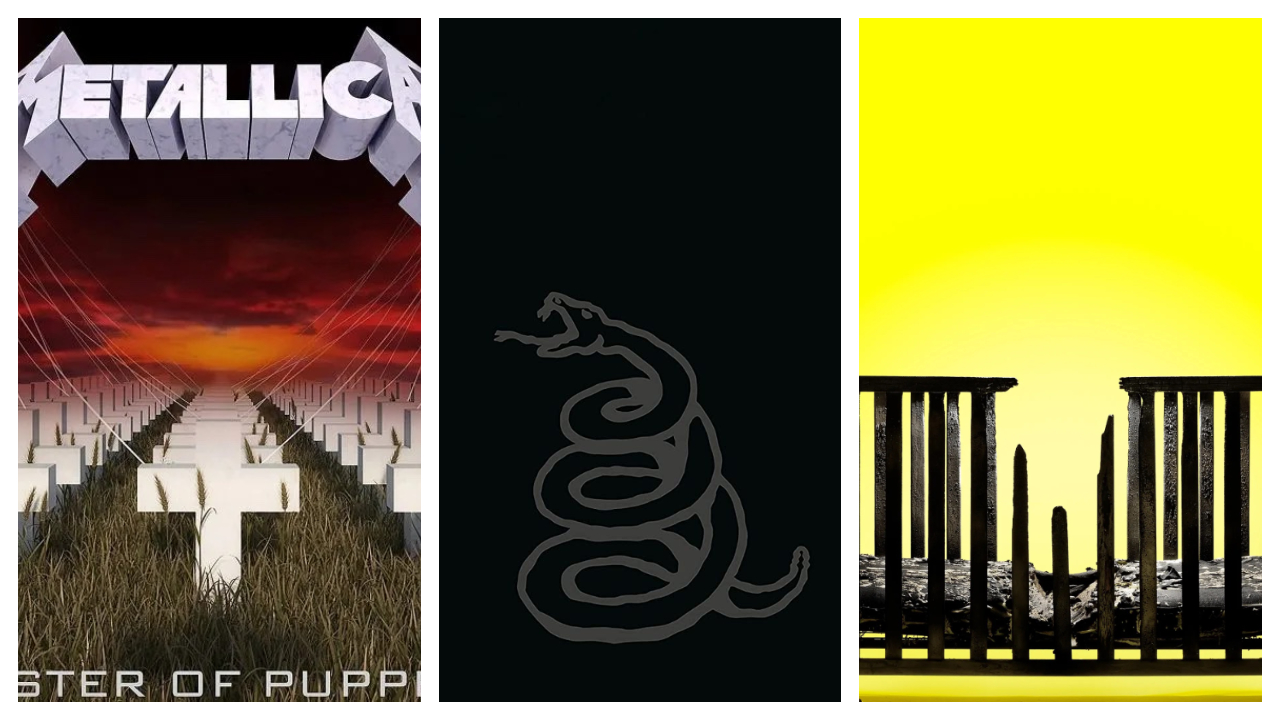A beginner's guide to Metallica in five essential albums
They're the biggest heavy metal band of them all, but if you want to understand Metallica's journey, these are the five records you need to hear

Just what exactly would the metal landscape look like if we'd never had Metallica? The band that invented thrash metal with Kill 'Em All, defined it with Master Of Puppets and then took metal to the masses in the 90s, the Four Horsemen's storied career is amongst the most fascinating and unique in all of heavy music.
They've survived tragedy, implosion, changing trends and fan backlash to remain at the very top of metal's tree, never afraid to throw themselves into a new challenge or stake their names on a big ol' left-turn of a project (Orion Festival! Their own movie! Lulu! Playing Antarctica!). At the heart of it all remains James Hetfield and Lars Ulrich, the occasionally uneasy, always entertaining dynamic that has driven the band relentlessly onwards, even in the face of immense controversy and upheaval. With Kirk Hammett's ever reliable presence on lead guitar and Rob Trujillo now officially their longest-serving bassist, they've also consolidated their steadiest lineup in their history.
As the band breeze into their fifth decade on this earth, they also still find fresh ways to win over new fans; in 2022, Master Of Puppets was unearthed to a whole new generation courtesy of Stranger Things. With that in mind, if you're looking for a quick guide to how Metallica's career got them to this point, we've got the five albums you need to hear.

Kill 'Em All (1983)
A sharp shot of adrenaline into a Bay Area scene that was on the rise, Kill 'Em All didn't just officially announce Metallica to the world, but lit a fire under the thrash movement that would push heavy metal to its extremities, bringing a harder, faster edge to proceedings. Blending punk rock attitude with NWOBHM histrionics, it's easy to forget just how many iron-clad Metallica classics the quartet had in their arsenal from the off. Hit The Lights, Jump In The Fire, Whiplash, Seek & Destroy...these are generational anthems that sound every bit as frenetic and vital now as they did forty years ago. Metallica would refine their style as time moved on, but for pure, heavy metal piss and vinegar, it doesn't get any better than this.
Master Of Puppets (1986)
Just a year after Kill 'Em All put Metallica on the map, Ride The Lightning confirmed them as the most exciting band of their generation with an incredible show of heavy metal thunder and thoughtful, emotive songwriting. Amazingly, they went one even better for album number three. While you could argue that Slayer's Reign In Blood displays thrash at its mot venomous and muscular, Master Of Puppets is an astonishing achievement: an expansive, multifaceted metal masterpiece that combined full-on thrash assaults with brooding, imperious anthems and emotionally-charged epics. This wasn't just the sound of a band reaching their creative apex, but the sound of the metal scene itself reaching a new peak, and an album that'd inspire generations of bands to come. As many old school fans will be quick to tell you, it's arguable that Metallica never quite matched these heady heights again.
The Black Album (1991)
There was no turning back from this. After the devastating loss of Cliff Burton, arrival of Jason Newsted and triumphant (if strangely produced) bounce back of ...And Justice For All, Metallica stuck Bob Rock behind the mixing desk and penned a set of songs that'd officially introduced stadium metal to the world. The results would go on to become the biggest metal album of all time, turbo-charging their trajectory, shoving heavy metal into the mainstream's consciousness like never before and outraging many of their most diehard fans. The moaners were undoubtedly missing out: The Black Album was, by any reasonable measurement, a brilliant record, a little top-heavy, maybe, but nevertheless stacked with massive anthems that would become legendary as time wore on. Heavy metal would never be the same again.
Load (1996)
If you needed any evidence that Metallica were unfazed by the negative reaction from certain quarters to The Black Album, this was it. While its squillion-selling predecessor at least kept its fingertips hovering above the kinds of sonics that Metallica had built their career on, Load was a full-on dive into new waters. Out was thrash and traditional heavy metal entirely, in were short hair cuts, plus the kinds of grunge, alt-rock and groove metal sounds that were dominating the rock scene at the time (with a dash of outlaw country for good measure). Metal traditionalists were appalled, but you'd be daft to deny that the likes of Bleeding Me and The Outlaw Torn represented a new level of emotional maturity for the band, Hetfield in particular delving into some of his deepest and darkest mental corners to produce his most impactful lyrics yet. Load was confirmation that the Metallica many of us knew and loved in the 80s was gone - at least for now.
Sign up below to get the latest from Metal Hammer, plus exclusive special offers, direct to your inbox!
72 Seasons (2023)
After the exit of Jason Newsted and disastrous but arguably necessary misstep of St Anger, Metallica rallied with the far better received Death Magnetic (2008) and Hardwired...To Self-Destruct (2016), both of which embraced their heavy metal roots while still trying to produce anthems that fit in the increasingly vast metal landscape of the 21st century. In many ways, however, it's 72 Seasons that best represents a culmination of the band's entire journey so far, packing everything from speed metal bangers (Lux Æterna) to stomping stadium metal anthems (If Darkness Had A Son) to Load-aping alt-metal epics (Inamorata). It also boasts by far the best production of Metallica's post-90s output, and while questions lingered over the Four Horsemen's ability to self-edit, few could argue that 72 Seasons didn't represent a fine entry for a band now four whole decades on from their debut.

Merlin was promoted to Executive Editor of Louder in early 2022, following over ten years working at Metal Hammer. While there, he served as Online Editor and Deputy Editor, before being promoted to Editor in 2016. Before joining Metal Hammer, Merlin worked as Associate Editor at Terrorizer Magazine and has written for Classic Rock, Rock Sound, eFestivals and others. Across his career he has interviewed legends including Ozzy Osbourne, Lemmy, Metallica, Iron Maiden (including getting a trip on Ed Force One courtesy of Bruce Dickinson), Guns N' Roses, KISS, Slipknot, System Of A Down and Meat Loaf. He has also presented and produced the Metal Hammer Podcast, presented the Metal Hammer Radio Show and is probably responsible for 90% of all nu metal-related content making it onto the site.
